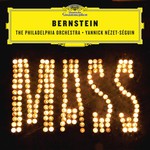
Bernstein: Mass
 $37.00
Out of Stock
$37.00
Out of Stockadd to cart
LEONARD BERNSTEIN
Bernstein: Mass
Kevin Vortmann (tenor) / Philadelphia Orchestra, Westminster Symphonic Choir, Temple University Concert Choir, The American Boychoir, Yannick Né
[ Deutsche Grammophon / 2 CD ]
Release Date: Sunday 1 April 2018
Jacqueline Kennedy commissioned Leonard Bernstein to compose this massive work for the inauguration of the Kennedy Centre in New York. It premiered on 8 September 1971. Bernstein decided to write an innovative Mass and what came out is, say, a Catholic Mass getting out of hand.
The Mass is seen through the eyes of a Jewish composer with an extraordinary palette of musical styles at his disposal, the work draws on influences from religious to popular and broadway musical genres.
Requiring two orchestras, rock band, marching band, multiple choirs and musical singers, for obvious reasons, the monumental work is rarely performed and even rarer on disc.
Born out of the political and social turmoil of the 60s, its main character experiences a roller-coaster of emotions and questioning of faith. On a wide variety of levels, this work is as relevant today as it was at its inception. Nixon, then President, refused to attend the premiere after an FBI warning for fear it could contain anti-war/anti-government sentiments.
Unified under his baton, Yannick Nézet-Séguin forges a powerfully emotional interpretation of this unique work - a cross-section of European and American Music.
"the fervent faith Nézet-Séguin has in this piece does come through. His tempos are often urgent and generally don't veer much from the composer's example. The orchestral meditations burrow deeply into Mass' darker side and the near-free-form freakout in triple meter just before the Celebrant's nervous breakdown has all the raucous, jazzy exuberance you would want." Classical Voice
"Nézet-Séguin might seem like just a bystander amid all the activity, but the fact that this recorded account is as coherent as it is attests to his multitasking strengths . . . it is a powerful artifact, a musical and theatrical response to a deeply troubled time that has cycled back into even greater relevance in the three years the recording has been in the can. That's more benefit accruing to the common good than can be claimed for many a masterpiece." Philadelphia Inquirer